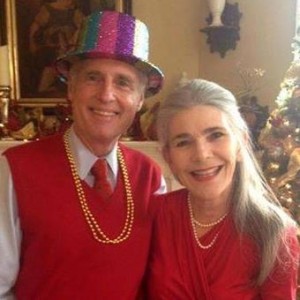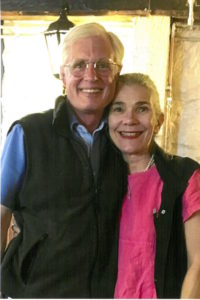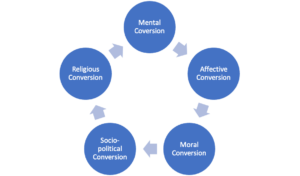 Unsurprisingly, I have become increasingly uncomfortable with the tone of political debate in Washington and how, on important matters, each party’s desire to win the next election often eclipses concern for the national interest. We have seen this phenomenon in debates over the War on Terror, the debate over the Gaza War, Abortion, Tax Policy, the role of the Federal Courts, the Federal Deficit, Social Security Reform, and other issues that profoundly affect the quality of life we and our children enjoy into the next generation and beyond. Both political parties tend to frame the problems in such a way as to win votes from their electoral base but make realistic compromise almost impossible. Much of the time, the facts are distorted in service to a political agenda.
Unsurprisingly, I have become increasingly uncomfortable with the tone of political debate in Washington and how, on important matters, each party’s desire to win the next election often eclipses concern for the national interest. We have seen this phenomenon in debates over the War on Terror, the debate over the Gaza War, Abortion, Tax Policy, the role of the Federal Courts, the Federal Deficit, Social Security Reform, and other issues that profoundly affect the quality of life we and our children enjoy into the next generation and beyond. Both political parties tend to frame the problems in such a way as to win votes from their electoral base but make realistic compromise almost impossible. Much of the time, the facts are distorted in service to a political agenda.
Unfortunately, we Christians can become a part of this regrettable phenomenon. Conservative Christians are often looked at as mere tools of the Republican Party, and Liberal Christians are frequently seen as mere tools of the Democratic Party. To some degree, the charge has been true. Both groups are inclined to reject the policies of the other violently and sometimes resort to actions that border on disloyalty. Amidst all this, the question remains, “How should Christians act as we bring our faith to bear on our decisions as citizens and public servants?”
A Text to Guide Our Meditation
Here is a text from First Peter:
Be subject for the Lord’s sake to every human institution, whether it be to the emperor as supreme or to governors as sent by him to punish those who do evil and to praise those who do good. For this is the will of God, that by doing good, you should silence the ignorance of foolish people. Live as free people, not using your freedom as a cover-up for evil, but living as servants of God. Honor everyone. Love the brotherhood. Fear God. Honor the ruler God as placed over you (I Peter 2:13-17)
Introduction: Two Visions
A critical aspect of reading the Bible, and history for that matter, is that it gives us a perspective on our lives. There is no more accurate saying than the one that goes, “Those who forget history are doomed to repeat it.” Because most people do forget history, the fact is we do repeat it. And, because it is also true that “The more things change, the more they remain the same,” the same kinds of problems occur in generation after generation. So, although Peter’s times and culture were very different from our own, the message of today’s text is as important today as it was in 64 A.D.
The Bible gives two very different and complementary teachings concerning the relationship between people of faith and their governments. I will call these two teachings the “prophetic stance” and the “accommodative stance.” The difference between these two stances is best revealed in the difference between Jesus driving the money-changers from the temple (Luke 20:1-8; Matthew 21:12-17; Mark 11:15-19; John 2:13-22) and his saying, “Render unto Caesar that which is Caesar’s and to God that which is God’s” (Luke 20:19-26; Matthew 22:23-33; Mark 12:13-17).
In the Old Testament, we see both of these stances at work. The prophets of Israel often spoke against the evils of the kings of Israel and Judah and predicted the nation’s downfall as a result of unfaithfulness to God. We see this prophetic voice in the ministries of Elijah, Elisha, Isaiah, Jeremiah, and some of the Minor Prophets.
The lineal descendants of these prophets are seen on the right and the left as we experience harsh critiques from Christian groups on hot-button issues like war, abortion, the definition of marriage, and the like. Many of our younger members do not remember Francis Schaeffer, who wrote books like Pollution and the Human Race, How Shall We Then Live? and Whatever Happened to the Human Race? [1] Schaeffer is widely credited with providing the intellectual “heft” for what has become the “religious right. On the left, prominent Christians have written critiques of American culture and government. I think of William Stringfellow’s book, A Public and Private Faith. [2] And, on the right and the left, ordinary people have participated in abortion and anti-war protests. This is the prophetic stance at work in our time.
On the other hand, in the Old Testament, we also see figures such as Daniel, who serves evil and demented kings for most of his life, trying to make the best of a bad situation. We also see this approach in the Book of Esther as Queen Esther seeks to rescue her people, not by a critique of Persian civilization, but by working within the system for the betterment of the Jewish people.
I call this the “accommodationist approach,” not because it “accommodates” bad ideas or evil actions but because it works within the system as it exists to achieve the common good. Daniel, for instance, worked under Nebuchadnezzar to achieve good government for all the citizens of Babylon. In our own time, we think of the hundreds of active Christians in government and politics.
A problem with this approach today is that we are media-crazy. Protestors on college campuses, in public places, or outside the White House can be seen on television, making good media copy and increasing advertising sales. Hundreds of local, state, and national officials and employees of our governments who go to work each day and quietly labor for the public good just don’t make sensational copy. Quietly working to make things better doesn’t make headlines.
In this blog, I want to focus on the accommodationist approach. [3] During a lot of human history, Christians have had to function in the face of some kind of hostility to their faith and its consequences for public life. This was especially true of the very first Christians. When First Peter was written, there was tension between the church and the Roman establishment. The emperor Nero was hostile to the new Christian faith. He was engaging in periodic persecution, a persecution that would end with Peter’s death. [4]
I Peter was not the only book that noticed the capacity of religious faith to cause some people to take revolutionary positions against those in public authority. Paul relates the same message as Peter in Romans:
Let every person be subject to the governing authorities. There is no authority except from God, who has instituted those existing authorities. Therefore, whoever resists the authorities resists what God has appointed, and those who resist will incur judgment. For rulers are not a terror to good conduct, but to bad. Would you have no fear of the one who is in authority? Then do what is good, and you will receive his approval, for he is God’s servant for your good. But if you do wrong, be afraid, for he does not bear the sword in vain. For he is the servant of God, an avenger who carries out God’s wrath on the wrongdoer. Therefore, one must be in subjection to avoid God’s wrath and for the sake of conscience. Because of this, you also pay taxes, for the authorities are ministers of God who attend to this very thing. Pay to all what is owed to them: taxes to whom taxes are owed, revenue to whom revenue is owed, respect to whom respect is owed, honor to whom honor is owed (Romans 13:1-7).
There is no question but that America is in a post-Christian phase. Christians must learn to relate to our governmental structures in new ways. Robert George, a professor at Princeton University and a world-renowned scholar in the natural law tradition, speaks of a growing tendency of elites to consider themselves the “Brights” and those who continue to defend tradition and religious faith as the “Dims.” [5] This morning’s sermon is about how we can best learn to relate to those in power in this new Post-modern, post-Christian environment.
Mr. Jesus Goes to Washington: Submitting to Reality
Peter begins his teaching by urging his readers to “Submit yourselves for the Lord’s sake to every authority instated among men: whether to the king, as the supreme authority, or to governors, who are sent by him to punish those who do wrong and to commend those who do right” (I Peter 2:13). In modern parlance we might put it, “Submit to national, state and local authorities.”
Submission is not something we Americans are fond of doing, and submission is something that the rebellious ethos of the modern and post-modern world intensely dislikes. The word “submit” means “willing to stand under.” It means to submit oneself to someone else or to subordinate one’s desires and will to someone else or some institutional order. In Latin, the term might be parsed as “submission,” in other words, to regard my personal mission as less important than the public good. [6] In this case, it means to be willing to submit to the institutions of the state as they happen to exist at the time.
We submit not only because social order is in the common interest but because we have a deep faith that God will work in and through all authorities – even those we dislike. As Calvin says in his Commentary on First Peter, we submit to authorities not because we believe them to be infallibly good or acting in our or the national best interest, but because we believe that God is in control of history – “obedience is due to all who rule because they have been raised to that honour not by chance but by God’s providence.” [7] In a democracy, this applies to leaders elected by both political parties.
Doing Good Silences Opposition
Peter goes on to say that as we submit to authorities and do good deeds, we silence those who foolishly oppose God and the Christian faith. “For it is God’s will that by doing good you should silence ignorant and foolish men” (I Peter 3:15).
No aspect of modern culture so disturbs me as the tendency of the secular elites to make a straw man of some religious celebrity, like Jimmy Bakker or Jerry Falwell, and then discount the views of serious Christian thinkers. There is a lot of hostility to Christianity among certain folks, and a number of those folks are in the media, on college campuses, and active as public servants. Although there is a place to oppose this with strong words, there is also a place for us to respond by being good citizens, quietly active in government and politics, and doing as much good as we can toward others. When we do this, we silence those who oppose the Christian faith.
Respecting Others Silences a Lot of Opposition
A second way we can silence critics of faith and impact the tenor of public debate in America is by respecting others. Peter goes on to say, “Show proper respect for everyone: Love the brotherhood of believers, fear God, honor the king” (I Peter 2:17). We have seen growing disrespect for our national and other leaders during the last two Presidencies. I think this culture of disrespect towards authority began in the 1960s with the opposition to Vietnam and the scandal of Watergate. As important as it is to be vigilant in protecting our nation against unscrupulous leaders, we must also respect the leaders God has given to us. When Presidents and Cabinet members are shouted down by college students while giving speeches, when Christians throw things at public officials and publicly disrespect their office, we are participating in the decline of civility in our culture.
On the other hand, as we respect authorities and show courtesy towards leaders, we begin the process of restoring a sense of decency in our public life. A sense of civility and decency towards those who lead us will go a long way toward encouraging a better atmosphere in our national debates over good government.
Conclusion
We Americans have a deeply felt sense that things can be better and that we have a divine mission to fix everything wrong in the world. There is nothing wrong with this optimistic view of life and government. However, it needs to be tempered by a realization that leaders are fallen creatures just as we are; they are finite creatures who make mistakes just as we do. There is no perfect government or perfect leader. We need to remember the insight of the Prophets that only when Messiah comes will there be ideal leadership. In Isaiah 11, we are given a glimpse of this leadership:
A shoot will come up from the stump of Jesse; from his roots a Branch will bear fruit. The Spirit of the Lord will rest on him— the Spirit of wisdom and of understanding, the Spirit of counsel and of power, the Spirit of knowledge and of the fear of the Lord—and he will delight in the fear of the Lord. He will not judge by what he sees with his eyes, or decide by what he hears with his ears; but with righteousness he will judge the needy, with justice he will give decisions for the poor of the earth. … Righteousness will be his belt and faithfulness the sash around his waist. The wolf will live with the lamb, the leopard will lie down with the goat, the calf and the lion and the yearling together; and a little child will lead them (Isaiah 11:1-6).
It does not take too much intelligence to understand that this is not a vision of the world as it is in history but as it will be in the New Heaven and New Earth at the end of history. This is a lovely vision; Christians should always let it guide us as we act in history.
The search for a truthful, just, and life-enhancing community finds its ultimate symbol in the notion of a “Beloved Community.” There is no question but which Josiah Royce, who coined the term, saw in the church, and perhaps in John’s vision of the Heavenly City,” the root and ground of a transcendental vision of a “Beloved Community” as an eschatological realization of the hopes and dreams of all lesser communities. The Christian community looks back through the Scriptures to the beginning of the world. As a community of hope, it looks forward to the end of history and the renewal of all things. Thus, members of the Beloved Community look infinitely backward and forward in time, in both tradition and hope, to a future that encompasses all of humanity and human history. This is why Royce sometimes calls the “Beloved Community” the “Universal Community”—all people are invited to pledge their loyalty to and find meaning and purpose in the Beloved Community. [8]
Throughout history, Christians have worked for progress with wisdom and love. We seek the vision of the Kingdom of God while remembering that it cannot be fully and finally achieved in this world’s history. We await the return of the Savior. In the meantime, we are called to act in Love to make the best of a fallen world.
Copyright 2024, G. Christopher Scruggs, All Rights Reserved
[1] These books are collected in Volume 5 of the Francis Schaeffer, The Collected Works of Francis Shaeffer. Wheaton: Crossway Books, 1982. Each of these books was originally published separately.
[2] William Stringfellow, A Private and Public Faith. (Grand Rapids: Eerdmans, 1962).
[3] What I have called the accommodationist approach could with equal accuracy be called the transformative approach, since it seeks to accommodate social realities while at the same time bringing about transformation for the better in society and government.
[4] Archibald Hunter “Introduction to First Peter” in The Interpreter’s Bible. Vol. 12 (Nashville: Abingdon, 1957.
[5] Robert P. George, “The Phone Book Test,” an interview in Christianity Today. (June 2006):44-47.
[6] Geoffrey Bromily, ed, Theological Dictionary of the New Testament. (abridged volume (Grand Rapids: Eerdmans, 1985), 1159
[7] John Calvin, Commentary on the First Epistle of Peter. Tr. Rev. John Owen (Grand Rapids: Baker Books, 1993), 81.
[8] See, Josiah Royce, The Problem of Christianity (Washington, D.C.: Catholic University of America Press, 2001), 125











